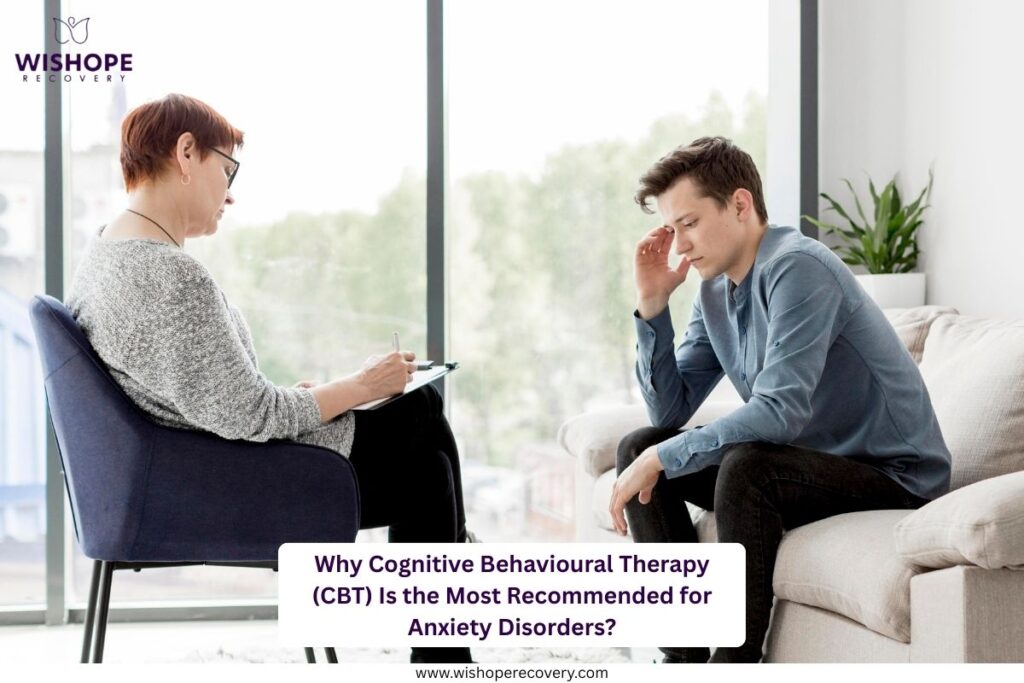Anxiety disorders have become the most common mental health condition in the United States, affecting millions of individuals each year. Despite the prevalence of anxiety, a striking 63% of people with anxiety disorders do not receive treatment, according to the Anxiety & Depression Association of America. While medications can be helpful for some, therapy plays an equally crucial role in treating anxiety. One of the most effective and widely recommended therapies for anxiety is cognitive behavioral therapy for anxiety. This blog from Wishope explores why cognitive therapy for anxiety is considered the go-to treatment for anxiety disorders and how it can make a significant impact on the lives of those who struggle with anxiety.

What is Cognitive Behavioral Therapy (CBT)?
CBT therapy for anxiety is a form of psychotherapy that aims to help individuals identify and challenge negative thought patterns and behaviors. The core principle behind CBT is that our thoughts, emotions, and behaviors are interconnected. Therefore, by changing the way we think about a situation, we can change how we feel and behave in response to it.
For someone struggling with anxiety, the negative thought patterns might include worrying excessively about potential dangers, catastrophizing situations, or overestimating the likelihood of worst-case scenarios. Cognitive behavioral therapy helps individuals recognize these irrational thoughts and provides tools to replace them with more balanced, realistic, and constructive ways of thinking.
Why is CBT Therapy So Effective?
- Focus on the Present and Future
Anxiety often results from excessive worrying about what might happen, and this constant fear can be paralyzing. Cognitive behavioral therapy for anxiety focuses on the present and future, teaching individuals how to address current anxieties and deal with situations that trigger anxiety. This future-focused aspect of CBT is essential because it equips individuals with tools to face future challenges without being overwhelmed by fear and worry.
In CBT, patients do not need to delve deeply into past experiences or traumas unless they are relevant to the current anxiety. Instead, the therapy is solution-oriented, giving individuals practical strategies to manage and overcome anxiety.
- Changing Negative Thought Patterns
One of the most crucial components of cognitive behavioral therapy for anxiety is identifying cognitive distortions — biased or irrational ways of thinking that contribute to feelings of anxiety. Common cognitive distortions include overgeneralization, where a person assumes that an adverse event will lead to a string of failures, or catastrophizing, where one imagines the worst possible scenario.
Cognitive behavioral therapy for anxiety helps individuals recognize these patterns and replace them with more accurate, rational, and constructive thoughts. By changing negative thought patterns, individuals can reduce the intensity of their anxiety and improve their emotional response to triggering situations.
For instance, if someone feels anxious about a work presentation, they may think, “I’m going to mess up and everyone will think I’m incompetent.” Through this behavioral therapy for adults, one can learn to reframe this thought by considering evidence that suggests they have prepared well and have delivered successful presentations in the past. This shift in perspective can dramatically reduce anxiety.
- Building Coping Mechanisms
Cognitive behavioral therapy for anxiety provides practical coping strategies for managing anxiety symptoms. These include deep breathing exercises, progressive muscle relaxation, and mindfulness techniques, which help individuals reduce physical symptoms of anxiety, such as rapid heartbeat and shallow breathing. These techniques can be used in real-time when experiencing anxiety, providing a sense of immediate relief.
Furthermore, behavioral activation is a key component of cognitive behavioral therapy. This involves scheduling activities that may initially cause anxiety but are necessary for personal growth or everyday life. For example, if social anxiety prevents someone from attending a gathering, they might use CBT strategies to gradually expose themselves to these situations, starting with less intimidating scenarios and working up to more challenging ones.

- Empowering the Individual
Perhaps one of the most powerful aspects of cognitive behavioral therapy for anxiety is that it empowers individuals to take control of their mental health. Rather than relying on a therapist to provide all the solutions, CBT teaches individuals to become their own therapists. They learn to recognize negative thoughts, challenge them, and replace them with healthier alternatives.
Over time, this process helps build confidence and resilience, as individuals see the tangible improvements in their ability to manage anxiety. This empowerment makes cognitive behavioral therapy not only effective in the short term but also in sustaining long-term mental health.
Techniques Used in Cognitive Behavioral Therapy for Anxiety:-
Several techniques are used in cognitive behavioral therapy to help individuals manage anxiety effectively. Some of these techniques include:
- Cognitive Restructuring or Reframing: This technique involves identifying negative thoughts and replacing them with more positive and realistic alternatives. For example, someone who fears social rejection may learn to challenge the thought “I’ll embarrass myself” by reframing it to “Everyone experiences awkward moments, and I can handle it.”
- Thought Challenging: In this technique, individuals are encouraged to challenge irrational beliefs by considering actual evidence. For instance, a person who is anxious about flying might review the statistics of safe travel to challenge their belief that the plane will crash.
- Behavioral Experiments: This technique is used when a person has catastrophic thinking. For example, someone afraid of public speaking may be encouraged to give a small speech in a low-pressure environment to test their fear against reality.
- Journaling: Writing down thoughts and feelings can help individuals become more aware of their anxiety triggers and develop strategies to handle them.
- Relaxation Techniques: Cognitive behavioral therapy incorporates various relaxation exercises, such as deep breathing and muscle relaxation, to manage the physical symptoms of anxiety.
Why Cognitive Behavioral Therapy for Anxiety is Widely Recommended?
Cognitive behavioral therapy has become one of the most recommended treatments for anxiety disorders for several reasons:
- Proven Effectiveness: Research consistently shows that cognitive behavioral therapy is highly effective in treating a variety of anxiety disorders, including generalized anxiety disorder, social anxiety, panic disorder, and specific phobias. Studies indicate that CBT leads to long-lasting improvements in both anxiety symptoms and overall mental well-being.
- Short-Term and Goal-Oriented: Cognitive behavioral therapy for anxiety is typically a short-term therapy, often lasting between 12 to 20 sessions. This makes it an attractive option for those looking for quick results without long-term commitment.
- No Need for Medication: While medications can be helpful, many people prefer to avoid or minimize their use of medication. Cognitive behavioral therapy offers a drug-free approach to managing anxiety, which can be particularly appealing to those who are wary of potential side effects or dependency.
- Versatile and Accessible: Cognitive behavioral therapy can be delivered in various formats, including individual therapy, group therapy, and even online therapy. This makes it widely accessible to individuals, regardless of their location or personal preferences.
Conclusion
Cognitive behavioral therapy for anxiety is one of the most effective and widely recommended treatments for anxiety disorders. By addressing negative thought patterns, offering practical coping strategies, and empowering individuals to take control of their mental health, CBT provides a comprehensive and accessible solution to managing anxiety. Whether in-person or online, individual or group therapy, CBT equips individuals with the skills they need to face anxiety head-on and lead a more balanced, fulfilling life.
If you’re looking for cognitive behavioral therapy near me or the best CBT therapists near me in Waukesha, Wisconsin, you can contact Wishope Recovery for expert guidance and support in managing your anxiety and mental health.

